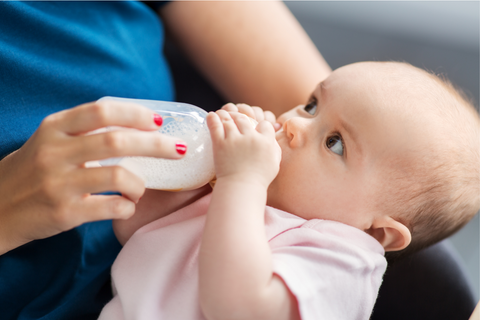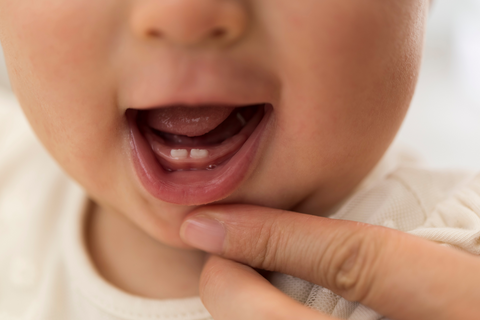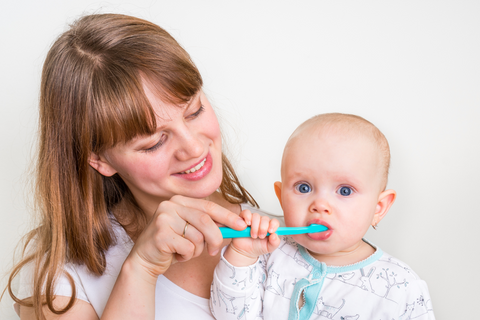Caring for your baby teeth and gums starts from the very beginning! Before your little one even grows their first tooth, taking special care of their gums is important for setting them up for healthy tooth development down the line. Through regular cleaning and being aware of common triggers as their teeth come in, it is possible to avoid possible cavities from developing in babies and toddlers. Whether you breastfeed or bottle feed, here are three things you should know about preventing bottle rot in your baby or toddler's mouth.

1. Defining Bottle Rot
Bottle rot is a buildup of sugar that contributes to bacteria growth surrounding a baby's tooth. When your baby or toddler regularly consumes any substance with natural sugar over time, such as formula, breast milk or juice, bacteria can begin around their little teeth. This buildup, if left untouched, can lead to cavities. While this is no reason to panic, it is a reason to take caring for their teeth and gums seriously from the start. There are certain factors that increase the chances of your baby or toddler experiencing bottle rot. These include tongue tie, lip tie and consuming a bottle at bedtime while falling asleep. Both a tongue tie and lip tie can prevent your baby from performing natural motions, such as licking their gums clean after feedings, as well as causing milk to collect in their mouth that can expose their teeth to that sugar. Likewise, if your baby or toddler falls asleep while drinking milk, sugar can sit in their mouth overnight and contribute to bacteria growth. To prevent these things from happening, use a damp washcloth to wipe gums clean after feeding. Additionally, use a baby or toddler approved toothbrush to clean those tiny teeth before bedtime.

2. Symptoms To Look For
If you regularly care for your child's teeth and gums and they do not exhibit any of three influential factors outlined above, then you likely do not need to worry. If bottle rot is a brand new concept for you and you have not done much preventative care up until now, don't fret! There are signs and symptoms that signal a problem so that you can take note of any possible hints that point to a bacteria buildup:
- Gum pain that is not associated with teething
- The appearance of a slimy substance forming over baby's gums
- Spots forming on teeth that are yellow, white or brown in color
- If any of these signs are visible, simply make an appointment for your little one to be seen by a dentist and they will instruct you further. Regardless of whether you notice these signs or not, it is recommended for your little one to visit the dentist once their first tooth has come in. Either way, getting feedback from your child's oral health care provider can help ease your worries and address any possible issues.
3. Common Questions
Question: Are there any dietary changes I can make to my little one's diet to avoid bottle rot?
Answer: Avoiding excess sugar in your toddler's diet is always a good idea. Both natural sugars and artificial sweeteners alike have the ability of causing buildup around their teeth. Items like fruit juices and other sugary snack foods can increase the chances of oral health issues, so it is best to avoid unnecessary consumption of these things. Likewise, natural sugars found in many healthy options can also cause problems, but with proper care and regular cleaning of teeth and gums, that can be avoided. Always be sure to wash bottles, cups and utensils well between feedings to ensure proper cleaning. Offer plenty of healthy, organic food options for toddlers such as calcium rich foods (think leafy greens, yogurt & beans), vitamin dense foods (eggs, salmon, beef), and beware of excess sugars that can be found in common snack food items. Promote healthy eating and lead by example in this area. Your child is likely going to be more willing to try foods they regularly see you consuming, so be sure to model a well balanced, organic diet.

Question: Should I worry about spots showing up on baby teeth since they will fall out anyway?
Answer: While it is true that baby teeth will eventually fall out, they actually lay a very important foundation for the health of your child's future adult teeth. For babies, always take care to wipe their little gums down after feedings, introduce a child friendly toothbrush as soon as their first tooth appears and use it with them regularly. This will set the stage for lifelong care of their teeth and mouths, all while preventing a buildup of bacteria as they grow. Baby teeth that show signs of decay can become painful and interfere with daily tasks such as eating and talking. Help your little one to identify ways they can regularly care for their oral health by making it fun! From the time your baby grows their first tooth, help them brush while singing a song and read picture books about caring for teeth. This will help set the stage for them to continue these healthy habits into childhood and beyond!
Question: What kind of toothpaste should I use for my baby's first teeth?
Answer: While your baby's oral health care provider can likely recommend a great option for you, something as simple as coconut oil is great for preventing oral bacteria buildup! Coconut oil naturally kills bacteria and it has many additional uses, too! This is an all around great product to keep on hand with babies and small children in the home. To use as a toothpaste, place a pea sized amount of organic coconut oil on the toothbrush and brush carefully over their teeth and gums. Help them rinse by showing them how to spit in the sink (more for toddlers) or simply wipe clean with a wet washcloth for younger babies.
Learn More
Homemade Teething Biscuits
The Dirty Dozen vs The Clean Fifteen: When To Buy Organic Fruits & Veg
Best European Organic Baby Formula (organicbabyfood.shop)
How To Sterilize Baby Bottles | How To Clean Baby Bottles

